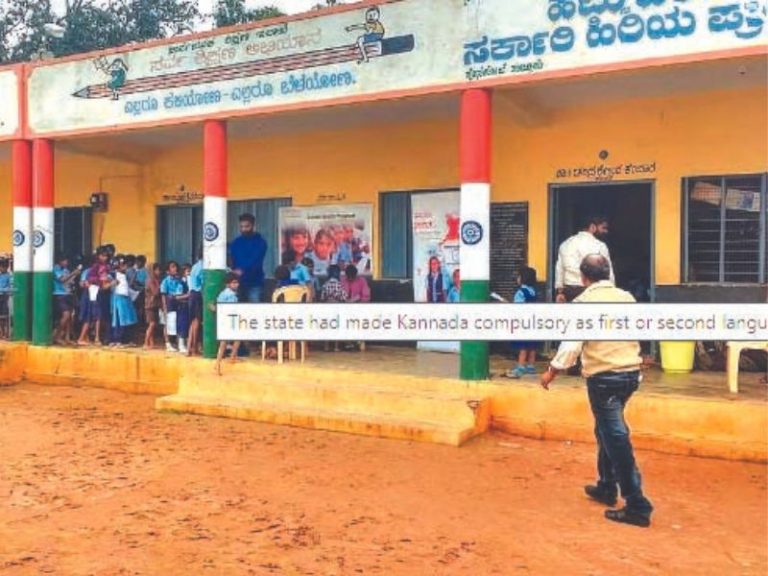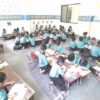No products in the cart.

Karnataka: Education neglect spanner
With the tempo for state legislative assembly elections scheduled for next May building up, Karnataka’s ruling BJP government is pulling out all stops to ensure that it is returned to power in this southern state which is critical for the BJP high command — now in its second term at the Centre — to make a breakthrough in peninsular India.
Educationally and industrially more advanced and with good records of religious tolerance and harmony, the five states of southern India have proved to be less susceptible than the populous Hindi belt BIMARU (Bihar, Madhya Pradesh, Rajasthan and Uttar Pradesh) states to the anti-Muslim and Christian electoral rhetoric of the BJP/RSS sangh parivar leadership. Even though it’s been ruling in Karnataka (pop.63 million) since 2019, this incumbency was engineered by mass defections from the Congress party and Janata Dal (S) rather than victory in the assembly election of 2018.
But even as the state government’s leadership is going all out to arouse sub-nationalist Kannada pride by resurrecting a border dispute with Maharashtra, insisting on Kannada as the medium of education across the education spectrum, and demonising the state’s Muslim and Christian communities by banning wearing of the hijab in education institutions and accusing Christian clergy of forced religious conversion to consolidate the majority Hindu vote, recently released data revealing alarming neglect of primary-secondary education in the state may throw a spanner in the BJP’s election strategy.
According to the latest United District Information System for Education (UDISE) 2022-23, 2.6 percent of Karnataka’s 76,905 schools do not have functional toilets for girl children and 1,532 don’t have separate toilets for girls. Moreover, 5,047 schools (6.5 percent) don’t have functional toilets for boys. In 328 schools there are no toilets at all.
Surprisingly even though Bengaluru, the state’s admin capital, is the hub of the ICT (information communication technologies) industry, only 49 percent of schools and (34 percent of government schools) are equipped with functional computers and 24.84 percent (and only 6 percent of government schools) are connected with the internet.
And although Karnataka has a good record of high quality education, in the Performance Grading Index of the Union ministry of education (2022), its rank has slid to #14 countrywide. In terms of quality of infrastructure in government schools it is ranked #28 countrywide.
Meanwhile despite the severe loss of learning experienced by 5 million children in the state’s 49,791 government schools, of whom a mere 6 percent have an internet connection, the budgetary allocation for public education (Rs.32,018 crore in 2022-23) has dropped to 1.69 percent of GSDP (gross state domestic product) from 1.72 percent in 2021-22. This despite the urgency to make good the learning loss of disconnected students of government schools which were locked down for almost two years during the Covid pandemic era.
Unsurprisingly, there’s rising public anger against the low priority being accorded by the state’s BJP government to education and human resource development.
“In 2012, the Supreme Court had directed that every school should be equipped with adequate toilets with running water. At that time the court had observed that denial of toilet facilities to children violates their right to free and compulsory education guaranteed under Article 21-A of the Constitution. Making this basic provision is not a herculean task. Local panchayat governments should be directed to identify schools lacking basic infrastructure and arrange for government funding. The latest UDISE data are a shocking indictment of continued government negligence and duty of care towards vulnerable children,” says Dr. A.S. Seetharamu, former professor of education at the Institute of Social & Economic Change, Bengaluru.
Adds Nagasimha G. Rao, director of Child Rights Trust, a Bengaluru-based NGO: “Under s.28 of the RTE Act, 2009, every school has to be managed by a School Development and Monitoring Committee (SDMC) in which parents are the majority. But the state government has made no attempt to constitute SDMCs with the few which have been established dominated by local politicians. Principals should be empowered to constitute SDMCs as stipulated in the RTE Act. Government schools are community assets which need care and attention. The state government is well aware of the need for computers and internet facilities in all schools, especially after the prolonged closure of schools during the Covid-19 pandemic. It’s high time opposition parties and the public made education into a major election issue.”
Although the BJP has secured sweeping election majorities in the BIMARU states of north India despite neglecting education, in peninsular India — and Karnataka in particular — where there’s greater awareness of the social mobility power of quality education, the Hindi, hindutva, and anti-minorities rhetoric is unlikely to reap a similar harvest.
Reshma Ravishanker (Bengaluru)















Add comment